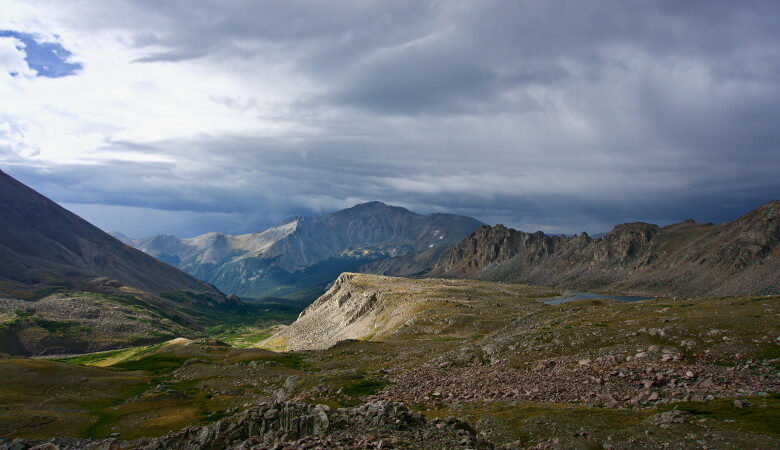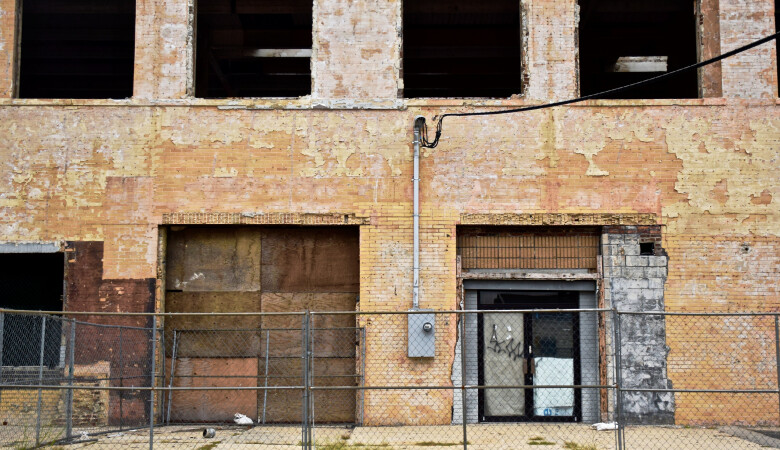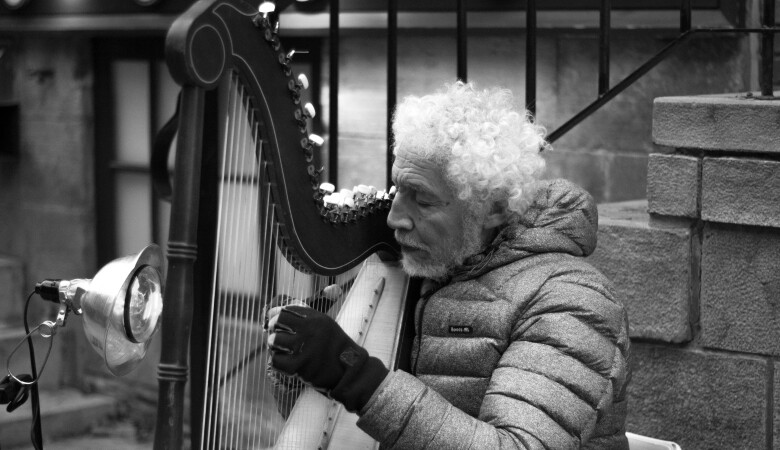The Resurrection of Jesus Christ (Matthew Sermon 149 of 151)
September 22, 2013 | Andy Davis
Matthew 28:1-10
Joy in Suffering, Resurrection of Christ, Exaltation of Christ, Worship
sermon transcript
Introduction
Christ has risen. Now, it's not Easter, I know, but Christ has risen. Amen. Amen. I was thinking about that. I get to preach today on the happiest day in history, the happiest thing that's ever happened, the most joy-producing, the most joyful event that's ever happened in history. This is the great answer to the problem of sin and death, and law and condemnation. The resurrection of Jesus Christ is the consummation of everything.
Now, as I was driving in, I had this thought. I'd never had this thought before. And I haven't worked it all out, so I'm a little nervous, but I'm gonna run with it here. This is the closest I'll ever get to base jumping right here, right now. I'm gonna run and jump. And we'll see what happens, but it has to do with this one concept and I'm working it through, and it's very, actually, very powerful and very pastoral, if you think about it. It has to do with something that you hear frequently connected with a joke, and it goes like this: stop me if you've heard this one. Stop me if you've heard this one. Alright, stop me If you've heard this one: Christ has risen from the dead. And I thought, that's not right. No, encourage me if you've heard this one so I can preach the resurrection.
The issue here is why is it that grand glorious news like the empty tomb loses its impact on us, so that we're not as joyful now as we were earlier in the resurrection of Christ? What happens to us because we've heard this one already, what new things can I say to you about the empty tomb that you haven't heard before? And if they're really new, they're almost certainly heretical, so I'll try not to say them. I'm not trying to say anything radically new here. What happens to us? It's a deep question actually. It's a deep question. Ecclesiastes 1:8 may have an answer. I looked that up right before I came in here. “All things are wearisome, more than one can say.” That's life under the sun in the book of Ecclesiastes, it's that vanity of vanities. All things are vanity, vain, in this world, we feel that acutely.
But It was this past week putting this thing together like a puzzle. It was like, wait a minute. Isn't that the last word in 1 Corinthians 15, the resurrection chapter? “Be steadfast and immovable, always abounding in the work of the Lord, because you know that your labor in the Lord is not,” what? “In vain.” The resurrection is the answer to the book of Ecclesiastes. And the emptiness and weariness that this life pushes on us. And I don't minimize it, I know you're going through trials, I know, I've looked in your faces over the last couple of weeks, I've sat with you, I know what you're going through, I'm not minimizing it. Death and sickness and cancer and treatments, and broken relationships and hurt and pain, and I know therefore that “Christ has risen” doesn't have the same impact every day that it does at other times, but it ought to. For I consider that our present sufferings aren't even worth comparing with the glory that Christ is gonna give us through His resurrection, it's not even worth comparing with it. It does not matter what you're going through. The resurrection trumps every card in a million decks.
So, it's my privilege through the Holy Spirit to try to re-kindle in your hearts again whatever greatest joy you ever had in the resurrection, and then go beyond it. I don't think I've ever heard of any joy in the resurrection, perhaps in history that I've heard in the history of missions, as in that video EE-Taow, which talks about the Zooks as they ministered in Irian Jaya, and they've been patiently unfolding redemptive history, they got to the life of Christ patiently unfolding, they did solid work for months with these folks, then Jesus was crucified and the people were shocked, this stone-age tribe, they couldn't believe that he would die. And then they preached the resurrection and they just went nuts. At last, they could see everything, their redemption, their own forgiveness, their own eternity in heaven, and they celebrated, they cut loose for three hours. They were throwing the Zooks up in the air, up and down and up and down. Finally like, “Okay, put us down over here.” And they went on and the celebration went on. I wonder if that tribe is still celebrating at that same level. Probably not, but they ought to be. They ought to be. They could through the Spirit. Amen.
I'm not minimizing the trials we go through, but didn't the Apostle Paul say sorrowful. Perhaps maybe we could say, “sorrowful, yet always rejoicing.” Like a compass needle returns to its true north, we return to joy in the resurrection, that's what you have. And so Daniel just sang, “There is a fountain filled with blood.” I would say, and I know he'd agree, there is a fountain filled with joy there too. And every time we go to the cross and the empty tomb, we can realize our sins are forgiven, God has adopted us, we have eternal life, we're going to heaven when we die, and God is gonna see us through all of our trials, it doesn't matter what we're facing, he who gave his only begotten Son and raised him up from the dead, he will get you through this life and he will bring you on into eternity. So that's the stuff I hadn't prepared. Alright, but as I was thinking about it, I just said, that's the burden. But the joy of preaching the resurrection, there's nothing new to say. But there's so much to say.
The Resurrection: The Climax of Redemptive History
The History of Death
So today, I get to preach on the historical, one of the historical accounts of the bodily resurrection of Jesus Christ. I get to preach on the answer to the problem of death. This is the problem that entered into the world, and it causes grief all over the world, there's not a nation exempt, there's not a community exempt, there's not a family or individual exempt from this curse of death. The wicked tyrant Joseph Stalin said this, “A single death is a tragedy, a million deaths is a statistic.” Well, that's the way he thought. No, a million deaths is a million tragedies. Death itself is a tragedy. Death itself is a curse from God on the human race because of Adam's sin, and that's the theology. It may be something we struggle with, we try to understand, but how it is that we are held accountable. But in the wisdom of God, Adam was our representative. And it says in Romans 5:12, “Sin entered the world through one man, and death through sin.” And in this way, death came to all men because all sinned. We all sinned in Adam. We all die in Adam. He represented us.
And since that time, there's been an indissoluble link between sin and death. The wages of sin is death. Ezekiel 18:4 says, “The soul who sins will die.” And we also sinned not only in Adam positionally as being human beings, but we also sinned actually as soon as we understood the law. As soon as the law came, sin sprang to life. And we died, we sinned and died. But in Jesus Christ, the death penalty has been paid, and we are clear of it forever. Now, we will die physically if the Lord doesn't return in our lifetime, but we will not die eternally, the second death, the death penalty has been paid. And that's the significance of the resurrection, by Christ's resurrection, it says in Romans 4, we have been justified.
Satan: The One Who Held the Power of Death… Now Defeated
We've been vindicated, we will live forever, and Satan, the one who held the power of death has been destroyed. He has been defeated at the cross and by his resurrection. He could not stop the resurrection of Christ, and therefore we have freedom from fear of death, it says in Hebrews chapter 2.
Ancient History Looked Forward to This: The Defeat of Death Predicted Again and Again in the Old Testament
Now, this was predicted, this was prophesied, that there would come a death-conqueror. In the garden, the serpent was told, “I'll put enmity between you and the woman, between your seed and hers. He will crush your head. You will bruise his heel.” So by his death, by Jesus' death he crushed Satan and sin and death. And God promised it again and again in his scriptures, I love Isaiah 25:7-8, there it says, “On this mountain, he the Lord, will destroy the shroud that unfolds all peoples, the sheet that covers all nations; he will swallow up death forever. The sovereign Lord will wipe away the tears from all faces, he will remove the disgrace of his people from all the earth. The Lord has spoken.”
Jesus Christ is the One Born of Woman, Who Came to Save Us from Sin and Death
How powerful is that? He's going to destroy death. Well, now for us, he has destroyed it. Christ Jesus, the one born of woman, the seed of woman, has been born at the right time in the fullness of time, he lived a sinless life under the law of God, fulfilling all of its precepts and its commands on our behalf. He was obedient for us, so that he could win for us a perfect righteousness, a perfect obedience to the law of God, and transfer it to us through our union with him by faith; and our guilt transferred to him, our substitute. He dies in our place, and we stand righteous and uncondemned by that union we have with Christ.
All Church History Looks Back to This Event: The Centerpiece of the Gospel is the Resurrection
Now, all of church history looks back at this event. It's been 2000 years. 2000 years, the good news of the empty tomb has been proclaimed in nations around the world, almost every tribe and language and people and nation has been told. The message of 1 Corinthians 15, “What I received, I passed on to you as of first importance: that Christ died for our sins according to the Scriptures, and that he was buried, and that he was raised on the third day according to the Scriptures, and after that, he appeared to many eyewitnesses.” And this is our hope. “If you confess with your mouth Jesus is Lord, and if you believe in your heart that God raised Him from the dead, you will be saved.” Praise God.
A Loving Errand and a Supernatural Interruption (vs. 1-3)
So that's just the intro. Let's look at the text and look at what it says in these marvelous 10 verses, we begin in verse 1-3 with a loving errand and a supernatural interruption. Now, just as we do this, this points again to the historicity of our faith, the historical roots of our faith. This is a historical account of some women who went to the tomb and the things that happened to them. We believe that the resurrection of Jesus Christ is a historical event. It really happened. We do not look at the resurrection as a myth or a fable, or an inspirational story, or certainly not a lie; it is history. It actually happened in space and time, and this account, these 10 verses is part of the historical record.
Look at verse 1, “After the Sabbath, at dawn on the first day of the week, Mary Magdalene and the other Mary went to look at the tomb.” In Mark 16, we have this parallel account, it says, “When the Sabbath was over, Mary Magdalene, Mary, the mother of James and Salome brought spices so that they might go to anoint Jesus' body. Very early on the first day of the week just after sunrise, they were on their way to the tomb.” Luke 23 and 24 gives us this, “The women who had come with Jesus from Galilee, followed Joseph of Arimathea, saw the tomb and how his body was laid in it. Then they went home and then prepared spices and perfumes. But they rested on the Sabbath in obedience to the commandment.” Then in Luke 24:1, it says, “On the first day of the week, very early in the morning, the women took the spices they had prepared and went to the tomb.”
A Loving Errand… But Some Measure of Unbelief
So that's a fuller picture of what is going on with these women, what's happening. It's a loving errand that they have, but there is mingled with it a measure of unbelief. It's a loving errand, they love Jesus, but there is mingled here a measure of unbelief. The Sabbath is over now, they're free now to resume work, they were interrupted by the Sabbath, and the women wanted to finish what they started doing, which is burying Jesus, they wanted to finish with the spices, they wanted to finish wrapping up his body.
Now, there's no doubt about the love and the loyalty these women have for Jesus, and that's based on faith, they believed in the things he said, they believed in what he did, I'm sure they were confused by his death, deeply grieved by it, but they just wanted to finish the work they had started, and the Sabbath had interrupted it, so they're hurrying there early.
Now, as they come, they're bringing these spices, and the spices are there to mask the stench of corruption, to mask the stench of decay, that's why they're done. They're not going to have an encounter with the living God, they're not going there to have an encounter with Jesus, resurrected from the dead. They're going to care for a corpse. They're not expecting a resurrection. None of them were. And all of this, despite the fact that Jesus had repeatedly told them that he was going to be raised on the third day. Again and again, they don't have to go to Isaiah 25. Jesus himself told them what was going to happen to him. So he said in Matthew 12:40, “As Jonah was three days and three nights in the belly of a huge fish, so the son of man will be three days and three nights in the heart of the earth.”
And then Matthew 16:21, “From that time on, Jesus began to explain to his disciples that he must go to Jerusalem and suffer many things at the hands of the elders, chief priests and teachers of the law, and that he must be killed and on the third day, be raised to life.” And then again, Matthew 20:17 -19. “Now, as Jesus was going up to Jerusalem, he took the twelve disciples aside and said to them, ‘We are going up to Jerusalem, and the Son of Man is going to be betrayed to the chief priests and the teachers of the law. They will condemn him to death, and will turn him over to the Gentiles to be mocked and flogged and crucified. On the third day he will be raised to life.’” He has been very clear about this, and frankly, the text gives us indication from that time on, he began saying to them, so he's saying it again and again.
Key Issue: They Did Not Understand the Scripture
Clearly, they did not understand from the Scriptures that Jesus had to rise from the dead. This is the very point that John makes in John 20:9, is the very point that Jesus makes with the two disciples on the road to Emmaus. “How foolish you are,” he said, “And how slow of heart to believe all that the prophets have spoken.” Did not the Christ have to suffer these things and then enter into his glory? And then beginning with Moses and the prophets in the Psalms, he explained all things that were written about himself.” It was there, they didn't understand these things from scripture, and they didn't understand these things from Jesus' plain statements about himself.
Christ Does Not Despise The Women’s Mixture of Faith/Love with a Measure of Unbelief
And so they come with their mixture of love and loyalty and unbelief. Some faith. Some unbelief. Isn't that us? Isn't it? Aren't we able to say like the father of that demon-possessed boy, “I do believe. Lord, Help my unbelief!” We're all like that. We have a mingling, that's why the resurrection is not as exciting today as whatever is the number one most exciting time you've ever had with the resurrection. It's because we're mingled, we don't have a pure faith, it's a mingled experience. And yet, isn't it marvelous how Jesus loves us anyway? And he cares for us and protects us and he's loyal to us Anyway? “A bruised reed he will not break, and a smoldering wick he will not snuff out.” He's gonna take the smoldering wick of your faith and he's gonna kindle it into a flame, and that's his love for us.
Who Moved the Stone? God Did! Through An Angel
And so there they are, they walk to the tomb, it seems in the darkness, and as they approach the tomb, one thought dominates their mind: who's gonna move the stone? There's this huge, just huge boulder that had been rolled in front of the entrance to the tomb weighing thousands of pounds, I'm sure. And these women have, they just have no idea: how are they gonna move the stone? And so that's a big problem, they wanna go there, but they don't know how they're gonna get to the corpse, so they have a problem. Well, God took care of the problem at every level. No need to move the stone, no need for the spices and no corpse. Amen. Hallelujah. The whole mission's changed. Everything is changed, radically changed.
So who moved the stone? In the famous words of Frank Morison, the apologetic writer, “Who moved the stone?” Well, God did through an angel. God moved that stone. We're gonna talk more about Morison and other apologetic writers next week. I wanna do a lot on apologetics next week, not this week, about how to take these truths and speak them to an unbelieving world that needs to hear about these things. But this one I just wanna work through just the historicity of the text, and Morison was a guy who set out to debunk the accounts of the resurrection and ends up being converted. How many times has that happened? Again and again, people read these accounts and say, “This is the truth. There's no way I can wrestle with this, I can't turn my back on it, Christ has risen.”
But it's very clear, the answer to the question, who moved the stone? Look at verse 2 and 3, “Behold, there was a violent earthquake, for an angel of the Lord came down from heaven, and going to the tomb, rolled back the stone and sat on it. His appearance was like lightning, and his clothes were as white as snow.” Now, the gospel accounts are powerful and clear, especially John about what happened to the stone. John is very clear in the Greek that the stone was lifted up and removed from the entrance. It was just entirely removed, not just rolled up in its little trough and propped up. It was just lifted and moved, you don't wanna mess with an angel. Let me tell you something. They can do awesome things. And so this angel just picks it up and tosses it aside and then sits on it, it's this awesome picture here, so he lifts it up and moves it.
What is the significance of the moving of the stone? Well, let me say plainly it wasn't to let Jesus out. Amen. I mean, picture that, how terrible would that be. I'm waiting, waiting. Or he's knocking from the inside. Jesus is gone! He's been raised from the dead. Jesus could have moved the stone himself, he didn't need any angelic help in that assistance, but he didn’t need the stone moved. He didn't need it moved. He came up out of those sticky linen grave clothes anyway, moves out of that, moves right through the stone wall. And he's gone.
How can that be? How do we understand that, it's not easy to understand. What is a resurrection body? What is it? What is involved in that? The best chapter on that, as I've said, is 1 Corinthians 15, and there the Apostle Paul, verse 42 and following, says, “The body that is sown is perishable, it is raised imperishable. It is sown in dishonor, it's raised in glory. It is sown in weakness, it is raised in power.” And this is the key phrase, “It is sown a natural body, it is raised a spiritual body.” Which is somewhat of a contradiction in terms, but it just shows the mysteries around the resurrection itself, it is a spiritual body, continuing. “So it is written, ‘the first man, Adam, became a living being’; the last Adam, a life-giving spirit. The spiritual did not come first, but the natural after that, the spiritual. The first man was of the dust of the earth, the second man was from heaven. As was the earthly man, so are those who are of the earth; and as is the man from heaven, so also are those who are of heaven. and just as we have borne the likeness of the earthly man, so we shall bear the likeness of the man from heaven. I declare to you, brothers, that flesh and blood cannot inherit the Kingdom of God.”
So there's enough information in there to say, we're talking about a glorious, powerful, spiritual body that is not flesh and blood in that sense, but still it's not a ghost or a spirit. So he can say in Luke, “Touch me and see; a ghost or a spirit doesn't have flesh and bones as you see I have.” And he's able to eat boiled fish, so he says, Jesus says, “I am not a spirit,” but Paul calls him “a life-giving spirit.” Spiritual body, that's the best I can make of it. And you're saying, “Pastor, you're just confusing us.” Well, that's as far as I can go. This resurrection body could do some astonishing things. It could just go through walls, it seems.
Jesus frequently didn't look like his normal self, he had to reveal himself to people who knew him well. He's sitting there with the two disciples on the road to Emmaus, he's sitting there breaking bread with them. Their eyes are open, they realize who he is, and he disappears. Bodies don't do that, normal bodies, but Jesus has this resurrection body. And Jesus in John 20, though the doors are locked for fear of the Jews that day and a week later, he comes and stands among them and says, “Peace be with you.” Now, Wayne Grudem in his excellent systematic theology is at pains to be sure, we're not dualists, thinking, spirit, good, body, bad, Jesus had a real physical body, so he says there's no evidence that Jesus passed through walls. I just wanna know how he got out of the tomb? Not the upper room, I'm saying the tomb. Was he waiting for the angel to let him out? How'd he get out of the sticky grave clothes? So I appreciate what brother Grudem is saying about the dualism. He had a real body, it's just a mysterious body and can do amazing things. And so there it is.
So why then was the stone moved? Not to let Jesus out, but to let us in, come and see the place where he lay, that's why it was moved. Come and see the evidence, come and see the place where he lay. And based on that evidence, the first generation, the apostles believed. John 20:8, John says, “He saw and believed.” So his faith in the resurrection was based on the grave clothes, the head covering folded off by itself the stone removed the missing body, no corpse. He saw the physical evidence and believed, but the next statement is more important. “They still did not understand from scripture that he had to rise from the dead.” That's what we get. We don't get to touch the grave clothes, we don't get to see the moving stone, we get scripture. And that's all you'll ever get, but that's enough, isn't it? It's enough. We read the scripture and we believe in the resurrection, amen. But the physical evidence was there for the eyewitnesses, for those that saw his glory and preached. 1 John, what they saw with their eyes, what they touched with their hands, what they experienced. Thomas could have, I don't know that he did, put his finger in the nail holes, it was physical and there were eyewitnesses to the resurrection. Christ is risen. Now, we go into all this history because it's very plain that if Christ has not been raised, our faith is worthless, there is no Christianity. So history matters, and so we go into these details.
The Earthquake and the Angel
So what happened? Well, there was an earthquake and there was an angel. A violent earthquake, for an angel of the Lord came down from heaven and, going to the tomb, rolled back the stone and sat on it. Behold, I like the “behold,” NIV tends to leave “beholds” out, I put them back in. Sometimes I even write them in. Behold, the angel suddenly comes and the earth shakes. And isn't that awesome? That's the second earthquake, great earthquake, in connection with Jesus' death and resurrection, the first happened after he died. The earth shook and rocks split, it says, and now we have this other earthquake.
This is an earth-shattering experience. The earth is moving under our feet here with the crucifixion and the resurrection. And it's pointing to, as I mentioned a few weeks ago, to the new heavens and the new earth, when everything will be transformed. I like to use the word resurrected, when the earth will be resurrected, similar to Jesus, and we will be given a new heaven and a new earth. The removal of all the things that can be shaken, they'll be removed, all of them removed, and eternal things will be set up that will never be shaken. And we're receiving a kingdom that cannot be shaken. So let us be thankful, and so worship God acceptably.
And so there's such a joy in this, and so the angel does it, and this angel is mighty. He caused the earthquake. The text implies that, “there was an earthquake, for an angel came down from heaven.” So the angel is shaking the earth, these are mighty beings. What was the touch-down? I always think they're like Apollo 11, the eagle has landed. So the angel comes down and touches down somewhere away from the tomb and moves over to it, so he lands, earthquake, and he moves over, picks up the stone mightily and moves it aside, and then, this my favorite part: sits on it. Like with angelic legs dangling. I just get that picture of complete ease. He's in the presence of Roman warriors, not intimidated at all by them, they're very intimidated by him. He's just sitting there comfortable, joyful and saying, “This is a happy day, this is the happy day.” And he's just waiting to talk to the women, don't need to worry about the stone, don't need to worry about the corpse, he is risen.
And so there he is, and look at his appearance, blinding light, this radiant glory from heaven, God the Father, giving some of his glory to the angel, and the angel radiating this blinding light from heaven. Just as Jesus' birth when he was born, and the shepherd saw the angel and he descended in the glory of the Lord, shone around and they were terrified. And so also these Roman soldiers, terrified at his glory. Angels are there ministering, angels are there at his birth, angels are there in his temptation, when he was in the desert and angels came and strengthened him. Angels were there in Gethsemane when he was sweating great drops of blood, and an angel was sent to strengthen him, and angels are there now at his resurrection, and they'll be there at his second coming, Amen. When the son of man comes in his Father's glory and all the angels with him, they'll all come for the second coming glory.
And so he is glorious, he is powerful. Here in this account, there's just one angel, but putting all the accounts together, there's definitely more than one angel, there's a good number of angels that are involved here. In Luke, it says, “Suddenly two men in clothes that gleamed like lightning stood beside them, and in their fright, the women bowed down with their faces to the ground but the men said to them, ‘Why do you look for the living among the dead?’” In John's Gospel, they're inside the tomb, sitting one at the head, one at the foot. And Mary looked in and saw them sitting there where Jesus' body had been, one at the head, one at the foot.
Terror and Assurance (vs. 4-6)
Now, in verse 4-6, we have terror and assurance. First the terror, In verse four, “The guards were so afraid of him that they shook and became like dead men. The angel said to the women, ‘Do not be afraid, for I know that you're looking for Jesus who was crucified. He is not here, he has risen, just as he said, come and see the place where he lay.’” So we have terror first, and then the assurance that the angel gives.
The Reaction of the Guards
Look at the reaction of the guards, these are Roman soldiers who had conquered the world in the name of Caesar, fearless warriors, and they are utterly paralyzed at one angel, utterly paralyzed. And frankly, they had every reason to be, every reason to be. They are terrified of him, and they're trembling, the Greek word for “shook” is the same as what happened to the earth, the angel made the earth shake and he made these men shake, and they're terrified and they end up paralyzed. They can't move.
The Reassurance of the Women
The glory of this angel, and they can do nothing, and the angel just disregards them, doesn't say anything to them at all, his mission is for the women and for the believers. And so he speaks a word of reassurance to the women, calming their hearts, and he said, “Do not be afraid, for I know that you're looking for Jesus who was crucified.” In other words, “You have nothing to fear from me because you're in a right relationship with him.” Right? You have nothing to fear. If you are in a right relationship with Jesus, you have nothing to fear from Jesus. But if you're not, you have every reason to be terrified.
He is an incredible friend. What a friend we have in Jesus, but he's a terrifying enemy. And he's the Lord of host, he's the Lord of armies, and so this is one of the soldiers in his army, this heavenly warrior. So he just ignores the Roman soldiers and he says to the women, he says, “Do not be afraid. Fear not, for I know that you're looking for Jesus and why you're here, and I understand your relationship with him. I'm here for you. So don't be afraid.” And then he says, “He is not here, he has risen, just as he said.”
Now, in Luke's gospel, I think it's clear that there's a little bit of a stronger rebuke for them, actually. You get a little bit of it here, “He has risen just as he said.” But it's clear, in Luke, listen to this, “In their fright,” it said, “The women bowed down with their face to the ground, but the men said to them, ‘Why do you look for the living among the dead?’” Why are you acting like he's a corpse? He's not a corpse, he is not here, he has risen. And then he's even clear, “Remember how he told you while he was still with you in Galilee: ‘The Son of Man must be delivered in the hands of sinful man, be crucified, and on the third day be raised again.’ Then they remembered Jesus' words.” So it's a bit of a mild rebuke, read the scriptures, believe the scriptures, it’s all laid out. Feed on God's word. Strengthen your faith in God's word. And I think that's a link to the very beginning of this sermon, if your joy isn't what it should be, get back in the word and strengthen your faith, and your faith will lead quickly to your emotions and to your joy. Remember what he said. They should have known.
The angels say the same thing in John toward Mary Magdalene. Remember, she's weeping, weeping, weeping. I just love it, weeping on the happiest day in history. It's the same thing with the two disciples on the road to Emmaus. I preached an Easter sermon entitled, “Downcast Walking with the Risen Lord.” Depressed and with the resurrected Jesus, how can that be? And he rebuked them for it. Why are you so downcast and discouraged? Read the scriptures. And so the angel says in John 20:13, “Woman, why are you crying?” “They have taken my Lord away and I don't know where they have put him.” He's not being put anywhere, he's going where he wants. Alright, just so you know. He's not put anywhere. And so he's risen. So why are you weeping? Same thing Jesus said to her when he began talking to her, “Why are you weeping?”
The Basis of their Joy: The Empty Tomb
And what should be the basis of their joy? The empty tomb. Look what the angel says, “He is not here, he has risen, just as he said. Come and see the place where he lay.” Now, you can only do that by faith, in your mind's eye, but go ahead and do it. Come now by faith and see the empty tomb. Come and see the place where he lay, and let your faith be strengthened by that, come by faith in the word and see. He is not here, he has risen. And so that's it. Just the body is gone.
Now, as I said in John's gospel, there are angels where the body was, and you have the grave clothes described, and you have the angel at the head and at the foot, I love that. As one commentator put it so beautifully, it represents the cherubim who were on the mercy seat on the Ark of the Covenant in the Old Testament. That's where the Lord said he would meet with Israel and in a glory cloud above the Ark. In the mercy seat between the cherubim, there in the glory cloud, he spoke to Israel. And that's where the atoning blood was poured on the day of atonement, there on the mercy seat between the wings of the cherubim, and so I think the position of the angels, one at the head, one at the foot and John's gospel tells us, this is the new mercy seat. This is where God will speak to you. The empty tomb, the crucifixion and resurrection, is where God will speak his final word to the human race. That's where the blood was poured for the atonement of our sins. It's all been fulfilled.
The Joyful Mission Begins (vs. 7-8)
This is the Beginning of the Spread of the News! Christ is Risen!
Well, then their joyful ministry begins, verses 7 and 8, “Go quickly and tell his disciples, he has risen from the dead and is going ahead of you into Galilee. There you will see him.” And I like this part. “Now, I have told you,” meaning, I have nothing more to say, get going. It's like that Jewish way of expression, it's in the Old Testament a lot. “Have I not told you?” In other words, there's nothing more to say, you have your orders. And so they're given a very, very clear ministry, a mission to go and tell the disciples, he has risen from the dead and is going ahead of you into Galilee and there you will see him.
And so they began running away, they're running, they're hurrying, they're afraid still, but filled with joy. Again, that mingling. That's just who we are. Afraid, what are they afraid of? Just look at it, is there anything to be afraid of at this moment? I tell you, no, there's nothing to be afraid of. If God is for us, who can be against us? Who cares? But they're still that mingling in our hearts, but still they are filled with joy, and so they go to tell the disciples that Christ has risen.
The Fact That It Was Entrusted to these Women Shows the Honor The Lord Held Them In
And isn't it marvelous how God chose to do it? Back then in the culture that they had back then, a woman's testimony wouldn't be accepted in the court of law. This is part of the evidence of why scholars in the 21st century, 20th century think this rings true. Because if you're gonna concoct or craft a fable, you wouldn't do it this way. So many elements of the Bible are that way, you just wouldn't show the sins of David and Peter. You wouldn't be so open, you'd try to cover that up. The Bible doesn't cover anything up and here the Lord willed that these women should go and tell the apostles concerning the resurrection, and it's a marvelous thing. And so they hurry away from the tomb, afraid and yet filled with joy.
Now, we know from John's Gospel, Peter and John went and saw for themselves as well, based on what they had heard from the women. I never found out, we'll never know, I guess, until we get to heaven what happened with the spices? I think they were probably left in there, like the Samaritan woman left her water pitcher. Doesn't matter, I don't need the spices anymore, we don't need a water pitcher, and they're running filled with joy to go like the Samaritan woman to tell the whole village, “Come and see a man who told me everything I ever did, could this be the Christ?”
The Highest Evidence: A Personal Encounter with the Risen Lord (vs. 9-10)
The Highest Evidence: Personal Encounter with the Risen Lord
And these women running to tell the disciples that Christ is risen, but they have one more beautiful perfect surprise that morning, one more. Better evidence than an angel, better evidence than the empty tomb, better evidence than the grave clothes. How about a personal encounter with the resurrected Christ? And that's where our account ends, the highest evidence, verse 9 and 10, “Suddenly Jesus met them.” That's what you can do in a resurrection body. Suddenly there he is, and he just appears and he's there. And he says, and I love this, “Greetings.” That's a kin to, “Morning.” It's so understated. It's so ordinary. “Hi. Here I am.” And again, there's, behold out of nowhere, he comes and their reaction is beautiful, it's priceless, frankly, it's the point of everything. It really is. It's the point of the crucifixion, and it's the point of the resurrection.
Their Reaction: Pure Worship… Falling at His Feet!!
They fall down at his feet and they worship him. As John Piper put it very plainly, in Let the Nations Be Glad, “Missions exist because worship doesn't.” That's the purpose of all of this, so that we would fall on our faces and worship the Lord, that we would worship the resurrected Christ. That at the name of Jesus, every knee should bow in heaven and on earth and under the earth, and every tongue confess that Jesus Christ is Lord.
Just Like in John’s Gospel… Jesus’ Message is Exactly the Same as that of the Angels
I think there's a little more to it though, because they're holding on tightly, and Jesus has to say, “Stop holding on to me.” Alright, in another account. “Stop holding,” so I think they're saying, “Look, we let you go before and look what happened, we're not doing that again. We're gonna hold on.” And Jesus says, “You can't hold on to me. I'm here for just a short time, 40 days, I'm gonna get the apostles ready to do their ministry and then I'm going to ascend to heaven. So don't hold on to me because I have to ascend to my Father and your Father and to my God and your God.” But it's so beautiful, how Jesus calls them brothers, “Go tell my brothers to go to Galilee and there they will see me.”
And so that's that beautiful, beautiful thing. It's the most surprising, the most spectacular aspect of the whole Gospel, J.I. Packer summed up the gospel in three words, “Adoption through propitiation.” Let me say it very plainly, we are adopted as the sons and daughters of living God, because Jesus shed his blood in our place for our sins. That sums it all up. Adoption through propitiation. We are brothers and sisters of the resurrected Jesus Christ, and he's not ashamed to call us that, he's not ashamed. We're sometimes ashamed of him, though we should never be, but he's never ashamed of us. And he is not ashamed to call us brothers. And so he says, “Go tell my brothers that they will see me.”
Applications
Christians: Know the Certainty of What You Believe
So what applications can we take from that? Oh my. How long do we have? Not long, 'cause we have the Lord's supper, we have the Lord's supper. But be certain of your faith, be rock solid, certain that Christ has risen from the dead. Be certain about the scriptures, testimony, Old testament and New to the resurrection of Jesus Christ. Be certain about these things. The word of God is perfectly true and reliable, and Jesus of Nazareth really is the Son of God and the Savior of the world. He is completely vindicated, and his blood shed on the cross is sufficient for your sins and for mine. And if we repent and believe in him, we will have eternal life. So repent and believe in him and trust in him. And if you have already done that years ago, continue to repent and believe and to trust and to stay close to him, because he is the vine and you are the branches.
Be Encouraged Even in the Face of Death
And if I can just say, allow your joy to be rekindled, rejoice and be happy, in the Lord, rejoice even in the midst of your suffering. In Acts 9:39, some women were standing around Peter weeping and showing him some articles of clothing that a woman named Dorcas, Tabitha, had made for them, and they're weeping, they're crying, why? 'Cause she's dead. And Peter sent them all out of the room, knelt down and prayed, and then raised her from the dead. Was it inappropriate for them to be weeping? No, no, you know why? Because she was gone now, there was no certainty she would be immediately raised from the dead, and life's hard and Dorcas made life easier and better, and so it's right for us to grieve. But not as those who have no hope. And so that's why I say sorrowful, yet always rejoicing. Sometimes we have to be sorrowful, but this message, the truth behind this message is an eternal fountain of joy for all of us.
Close with me in prayer. Father, we thank you for the time that we've had in the word, and as we prepare our hearts now, O Lord, to receive the Lord's Supper, I pray that you would send forth again in fresh affusions, the Holy Spirit, to take these bear emblems, to take this experience here of the Lord's Supper, and to make it very powerful. Thank you for what we've just heard in the word, and we ask, O Lord, that you would use it and multiply it. I pray for any that are here that walked in in an unregenerate state, that they are lost, they're apart from Christ, that they would even now, repent and trust in Jesus. I pray these things in your name. Amen.






























